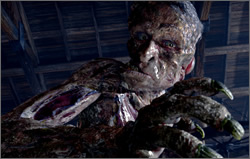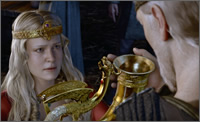Beowulf
Narrative and Character Types
There are lots of theories on the ways that stories work: some people say that most stories or narratives have similar themes, and similar characters. The following 'character types' come from Propp's work on folk tales:
HERO: Individual whose quest is to restore the equilibrium.
VILLAIN: Individual(s) whose task is to disrupt the equilibrium.
DONOR: Individual(s) who gives the hero something e.g. advice or an object.
HELPER: Individual who aids the hero with their set task.
PRINCESS/PRINCE: Individuals who need help, protecting and saving.
DISPATCHER: Individual(s) who send the hero on their quest.
FALSE HERO : Individual(s) who set out to undermine the hero's quest by pretending to aid them. Often unmasked at the end of the film.
Student Task
Can you match the characters from the film to the roles above? Write their character types in the boxes below







Justify your decisions based on evidence from the film, poem or both. Do some characters fit into more than one role?
Jealousy, Greed, Power
How does Unferth behave towards Beowulf? Why do you think he acts the way he does? Explore the following details from the poem to give you some ideas:"Beowulf's courage,
his steadfast strength
Was a burden to Unferth; envious man,
He could not
bear to be bettered"
Why do you think Beowulf agrees to kill Grendel and go after Grendel's mother? Do these images from the film give you any further ideas?


- If you are familiar with both the film and the poem, you could think about the differences between them - what motivates Beowulf in each version?
- What guesses can you make about the 'values' of warriors and kings at the time the poem is set? What was important to them, do you think?
- Do you think the old king sets a good example to his young warriors?
